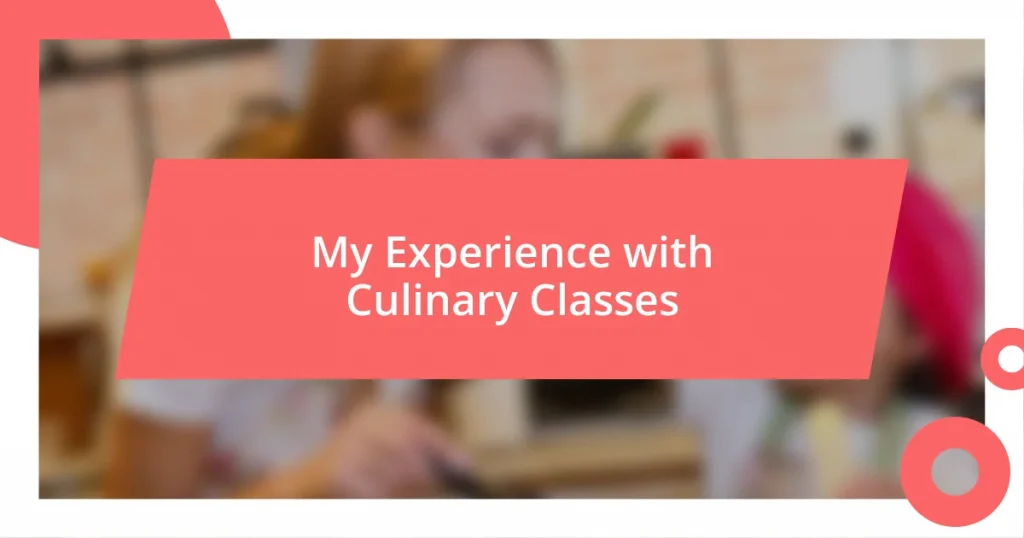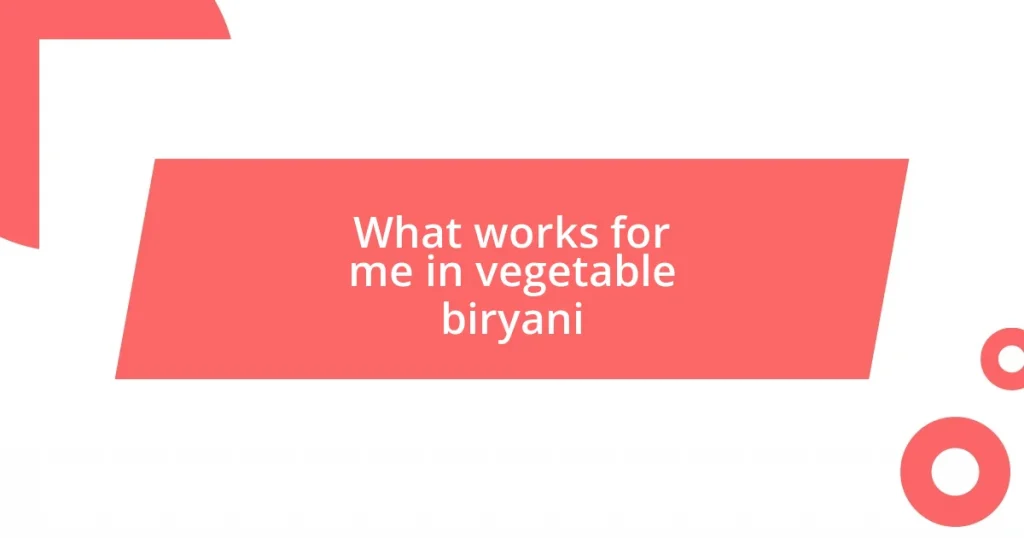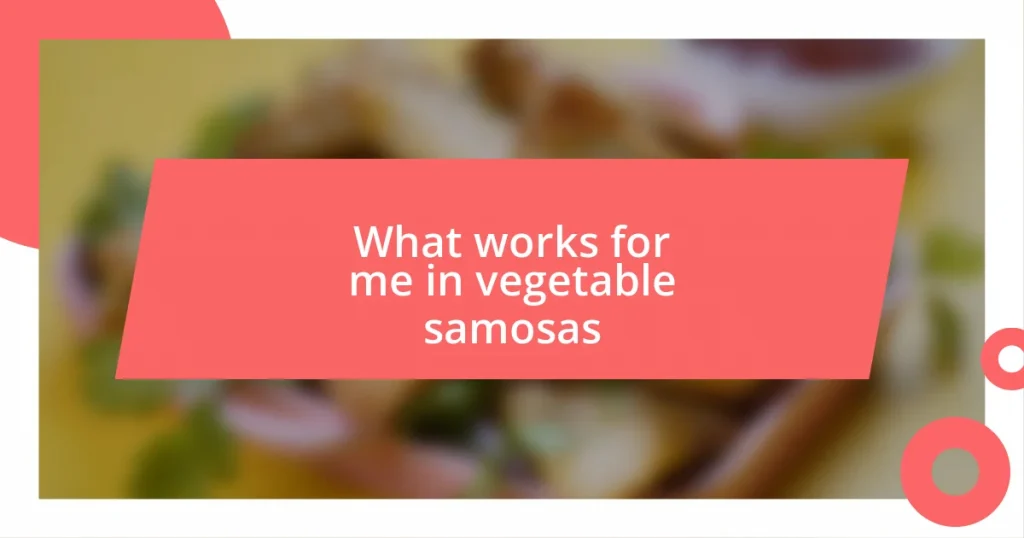Key takeaways:
- The initial passion for cooking sparked a desire to learn and create, leading to a profound connection with culinary arts.
- Choosing the right culinary school involves careful consideration of curriculum, instructors, facilities, and networking opportunities that shape one’s culinary journey.
- Practical applications of skills learned in culinary classes, such as knife skills, flavor pairing, and plating, enhance everyday cooking experiences and build confidence in hosting.
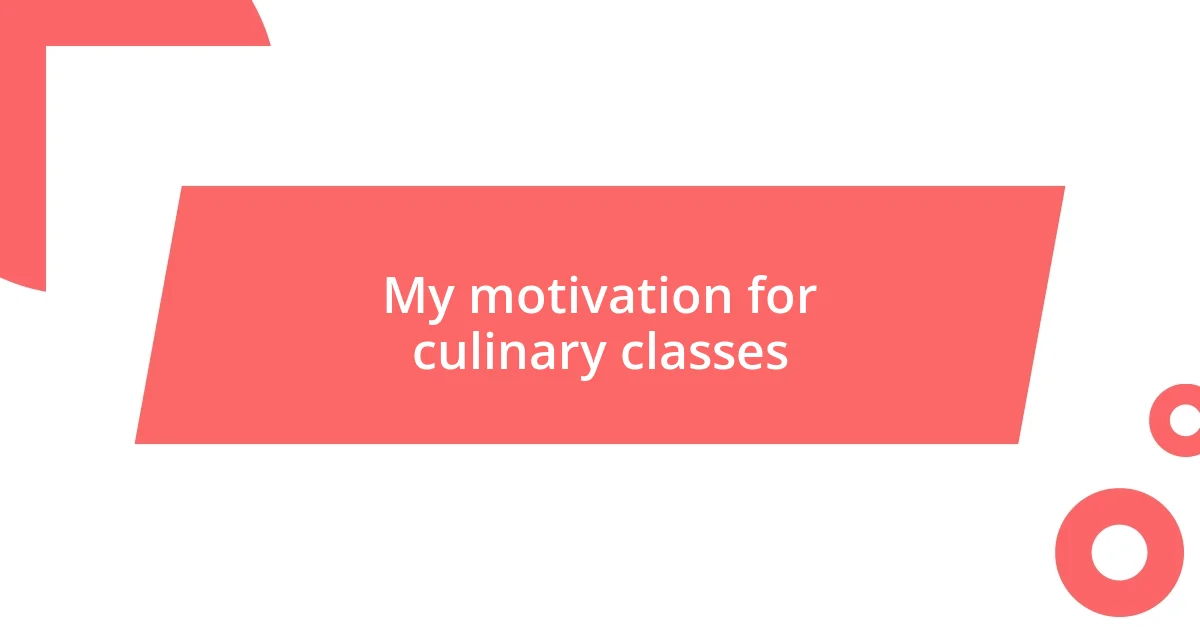
My motivation for culinary classes
Culinary classes have always intrigued me because they represent a fusion of creativity and technical skill. I remember the first time I stepped into a kitchen classroom, that unmistakable aroma of fresh herbs and sizzling garlic ignited a passion within me. It felt as though I was entering a world where the ordinary transformed into extraordinary, and I couldn’t wait to be part of that magic.
One of my main motivations stemmed from the joy I found in cooking for friends and family. Have you ever seen someone light up at the sight of a dish you created? I have, and it’s incredibly rewarding. Each gather-around-the-table moment felt like an opportunity to show love and care through food, pushing me to improve my culinary abilities to elevate those experiences.
I often pondered—what if I could not only cook but also create? The thought sparked my desire to learn more. Diving into culinary classes opened doors for me to explore flavors and techniques that I had never imagined before. Each lesson became a stepping stone toward a deeper understanding of culinary artistry, filling me with anticipation for the next unexpected dish I could bring to life.
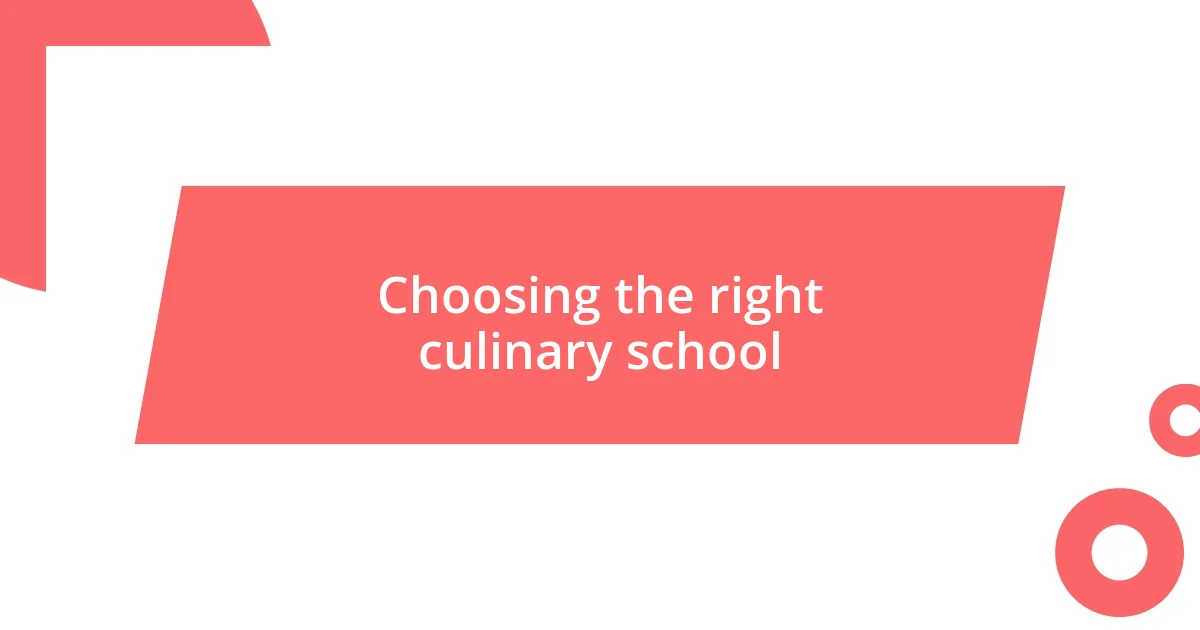
Choosing the right culinary school
When I started my journey in culinary education, I quickly realized that choosing the right culinary school was not an easy task. I felt overwhelmed, with so many options and differing philosophies at my fingertips. Ultimately, I learned that it’s crucial to reflect on what you want to achieve — whether it’s mastering classic techniques or diving into modern gastronomy.
Here are some key factors I considered when selecting a culinary school:
- Curriculum focus: Does the school emphasize the styles or cuisines you’re most interested in?
- Chef instructors: Are they experienced professionals with a passion for teaching and mentoring?
- Facilities and equipment: Are the kitchens well-equipped for hands-on learning?
- Class size: Smaller classes may offer more personalized attention.
- Location: Is the school placed in an area known for culinary culture and job opportunities?
- Networking opportunities: Does the school provide connections to restaurants and industry professionals?
Reflecting on these elements helped me navigate the sea of choices and find a place that felt like home. The right culinary school can make all the difference in shaping your culinary journey. It’s where I discovered my niche, built lasting friendships, and developed skills that still inspire me today.

Essential skills learned in classes
Culinary classes offered me a treasure trove of essential skills that I never expected to acquire. One standout moment for me was the day we tackled knife skills. The first time I expertly chopped an onion without crying, I felt a rush of pride. Mastering techniques like julienne and mince didn’t just improve my efficiency; it built my confidence in the kitchen. The precision required in these skills gave me a newfound respect for the craft of cooking.
Another crucial area I learned about was flavor pairing. I vividly recall a lesson where we experimented with different herbs and spices, crafting our own marinades. The thrill of blending unexpected ingredients and discovering how they enhanced a dish was exhilarating. Finding that perfect balance became an exciting challenge, allowing my creativity to flourish in ways I had never imagined before.
Lastly, the importance of plating was a game-changer. One class focused solely on presentation, where I learned that the visual aspect of a dish can elevate the entire dining experience. I still remember the pride I felt when my plate was the one everyone admired! Having the ability to plate a meal beautifully not only adds to its appeal but also fosters a deeper appreciation of the art that goes into cooking.
| Skill | Description |
|---|---|
| Knife Skills | Techniques for efficient and safe cutting, enhancing precision in preparation. |
| Flavor Pairing | Understanding how different ingredients work together to create harmonious dishes. |
| Plating | Artistic presentation of food, elevating the overall dining experience. |

Tips for succeeding in classes
When you’re in culinary classes, finding your rhythm is essential. I vividly remember the challenge of multitasking during busy kitchen sessions. The key for me was to plan ahead. I’d take the time to read the recipes thoroughly before class, imagining each step. Have you ever worked on a recipe without really knowing what to expect? It can be chaotic! Preparing mentally allowed me to focus better, which meant fewer mistakes and more successful dishes.
Embracing feedback is another vital tip I learned along the way. The first time my dish was critiqued, I felt a wave of vulnerability; I had poured my heart into it. However, I quickly realized that constructive criticism can ignite growth. I started viewing feedback as a gift, a stepping stone that helped refine my techniques and flavor profiles. Remember, without feedback, how can we truly progress in our culinary journey?
Joining study groups or cooking clubs can also make a difference. I remember meeting a few classmates after lectures, where we would experiment with new recipes together. The camaraderie we built made learning fun and less intimidating. Plus, sharing tips and tricks fostered a supportive environment that noted difficulties and celebrated successes. If learning feels too solitary sometimes, reaching out can foster growth and friendship in ways you might not have anticipated.
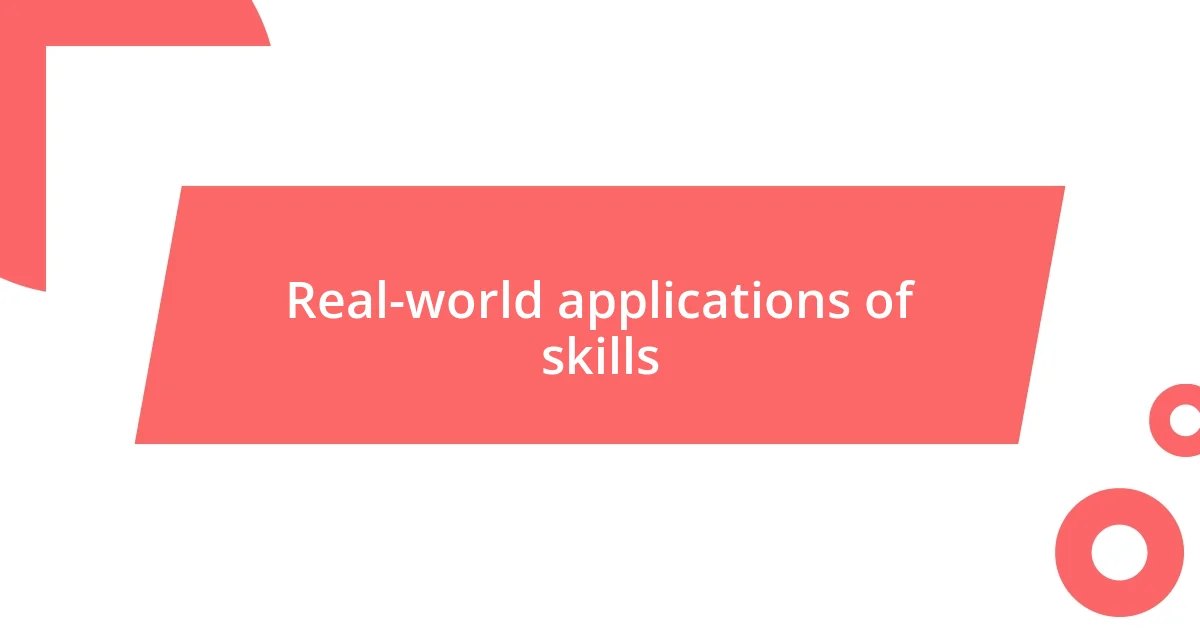
Real-world applications of skills
One of the most rewarding real-world applications of the skills I gained in culinary classes surfaced during family gatherings. I remember hosting a holiday dinner where I was in charge of the main dish. Applying my knife skills, I prepped vegetables with ease, impressing my family with how quickly I moved around the kitchen. It felt empowering to transform what was once a daunting task into a seamless experience, showcasing how practice can make such a difference.
Additionally, mastering flavor pairing opened doors for me, not just in class but in my everyday cooking. I find myself constantly experimenting when I create recipes on weeknights. For instance, one evening I decided to mix unexpected flavors like ginger and lime for a homemade dressing. The surprise of my family’s delighted reactions motivated me even more, showing how culinary skills can elevate meals, create lasting memories, and even spark joy around the dinner table.
Plating techniques, surprisingly, have been a game-changer for my confidence in inviting friends over. I distinctly recall a dinner party where I took extra time to arrange each dish thoughtfully, from the appetizers to the dessert. When my friends complimented not only the taste of the food but also how it looked, it sparked an inner thrill. Isn’t it amazing how aesthetics can impact our perceptions of a meal? By presenting food artfully, I realized I could create an experience that resonates deeply with those I share it with, proving that culinary classes offer skills that extend far beyond the kitchen.
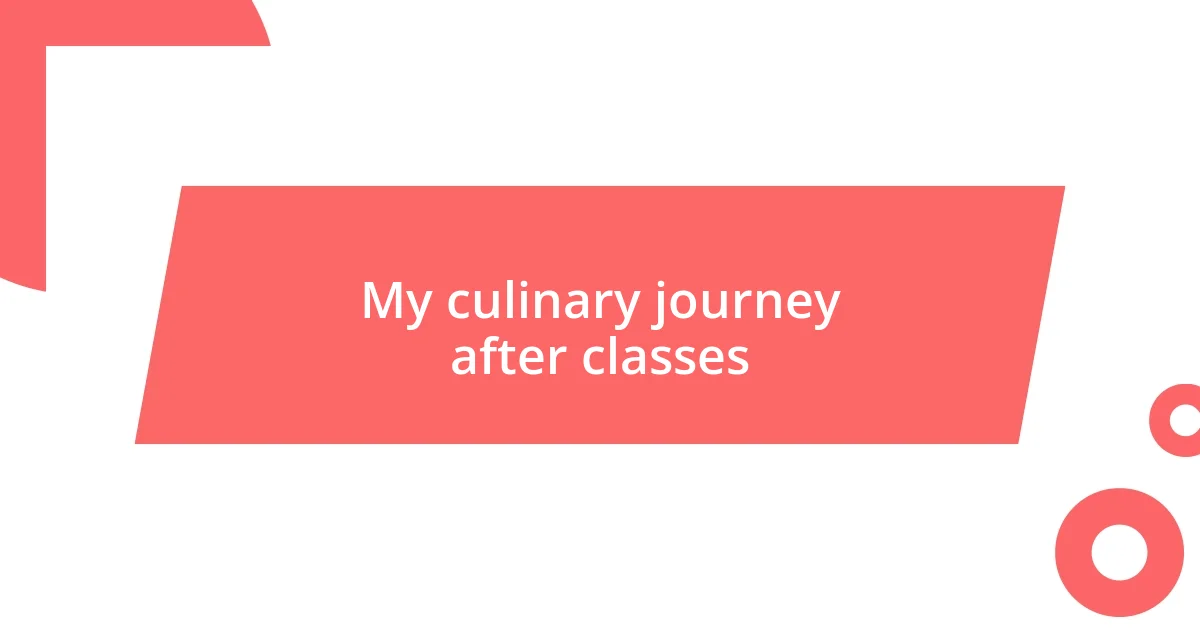
My culinary journey after classes
After completing my culinary classes, I dove headfirst into the kitchen, eager to experiment with everything I’d learned. One of my first ventures was making homemade pasta from scratch. I still remember that feeling of joy as I watched the dough transform under my hands, seeing the fruits of my labor turn into something delicious. Have you ever tried a recipe that felt like a true test of your skills? The taste of that freshly made pasta was a moment that confirmed I was on the right track.
As the months rolled on, my culinary journey took me to new heights, including a memorable experience volunteering at a local food bank. I learned to cook for large crowds, adjusting recipes on the fly and navigating the challenges of time constraints and ingredient availability. This not only reinforced my ability to think creatively under pressure but also magnified the importance of sharing food. I often reflect on how fulfilling it is to see smiles on grateful faces; it reminded me of the impact culinary skills can have, transcending beyond personal enjoyment to community connection.
Recently, I took part in a friendly cooking competition with friends, where we each had to prepare a dish using a mystery ingredient. The thrill of the challenge had my heart racing! I really dug deep into my knowledge about flavor combinations and techniques. In the end, I served a spicy chocolate chili dish that surprised everyone, and winning that little contest felt incredible. Doesn’t that kind of experience push you to explore your culinary boundaries? It’s these moments of creativity and connection that keep my passion alive and spark continual growth in my cooking adventures.










